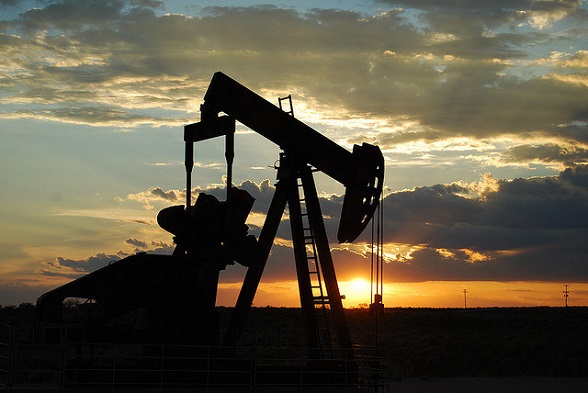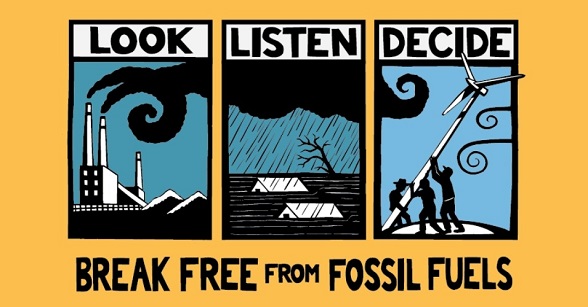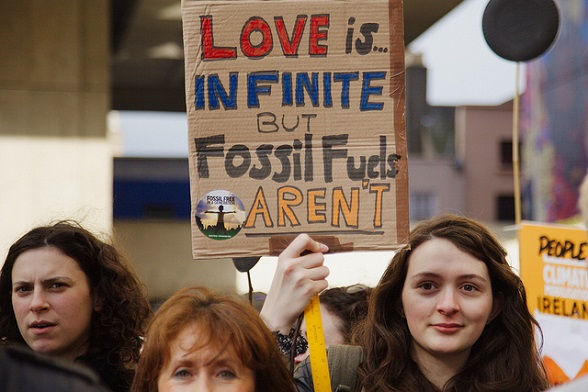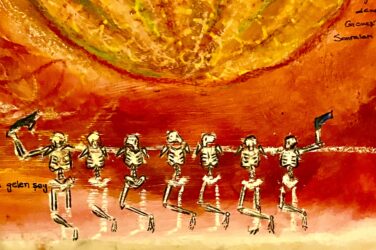Let’s talk about climate change. A phenomenon so big that although most of us don’t longer doubt its gravity or reality, for some reason we still manage to easily detach ourselves from any personal responsibility or guilt. Detachment has everything to do with scale. When the issue becomes global, understanding how our personal actions contribute to the vastness of the problem becomes extremely complicated for our human brain. After all, we are each one in 7 billion, and I, am not cutting down any trees.

Unlimited exploration of limited resources. Until when?
Climate issues are very much a matter of “out of sight out of mind.” Until our own house is not hit by a devastating hurricane we may never truly believe in the influence our actions have over the climate. But if we are educated and rational people, why is it still so difficult to care about climate change? The answer is quite simple; there is very little short-term return for a relatively large investment. The solutions are too drastic for us. It requires lifestyle changes, and everybody knows humans are allergic to change. We hate it, and we will avoid it at all costs. Even at the cost of our grandchild’s freedom to breath fresh air. And this lifestyle change is the worse kind of change yet; it requires us to abandon many aspects of our gluttonous and opulent lifestyle that have become habitual comforts of our daily life, yet knowing that we won’t live to see the products of our sacrifice.
For the majority of people across the planet, daily practices such as recycling, paying more for renewable energy, eating local, vegan & organic, using sustainable transport etc. require a complete transformation of their lifestyle and priorities. The effort that the transition to these practices requires is much greater than the personal benefits the individual will receive within their lifetime (apart from reduced risk of heart disease from eating less meat and increased exercise). The compromise is too big, and we will never receive a medal thanking us for being part of the solution.
More than this however, is the growing evidence and recognition that these small lifestyle changes are merely the tip of the (melting) iceberg – they are the bare minimum requirements for climate action, and the bottom-up social and economic input that is required to power our transition to sustainable societies. We need green-demand, for a green-economy.
Today, we are well aware that our small lifestyle changes will not save us from climate catastrophe alone. We now know that the only way to avoid the most devastating impacts of climate change from accelerating is by keeping fossil fuels in the ground. It is not a mystery anymore, and it should not be so complicated to wrap our heads around it. This is the answer: NO MORE BURNINGNG FOSSIL FUELS.
Now that we have deciphered the antidote for climate change mitigation, implementing the necessary actions should be pretty straightforward…its not – Actually climate change becomes even more overwhelming. It is no longer about the things that we can do individually, at home; but it is about phasing out huge and powerful industries and somehow transforming our entire economic systems to become powered by the sun and the wind. If climate change was huge before – it has just grown to cosmic dimensions.
But climate politics exist
The 21st United Nations Conference of Parties (COP21) took place this past December 2015 in Paris. 195 nations came together to agree on a global warming threshold of 2°C which is supposed to save us from the worse impacts of a boiling atmosphere.
This is the first time there has ever been a global agreement to act on climate change. And while this non-legally binding agreement will not be our saviour, it is a huge milestone because it solidifies the reality of climate change as a burning threat to humanity, our environments, and our prosperity. Thanks to the Paris Agreement, climate change is real in the political arena and it can be used as a tool for climate action at all levels. Now that politicians believe in its gravity, it should be much easier for us to care too.
Europe has a crucial role to play in leading the world towards a zero-carbon future. The EU has played a strong leadership role in guiding climate policy this far, and we can only expect to see the same leadership in the implementation of these policies. The EU holds huge responsibility as the continent with the most advanced nations in the world, to lead by example and set the pace for the rest of the world to abandon dirty energy.
However, we cannot expect climate change will be solved at policy level alone. With the Paris Agreement freshly out of the oven and currently waiting for nations to ratify, this is a crucial moment in history for environmentalists to play a protagonist role in shaping global change. Today, grassroots momentum is more important than ever.
Environmentalists must rise and multiplay!
Environmentalists today come in different shapes and sizes. The most common type of environmentalist is the everyday environmentalist. We do care, and we care deeply enough to ride our bike to work, buy local food, and religiously recycle. We educate our friends on Facebook and we read the news everyday and get very upset at corporate greed destroying the rainforest.
Then there are the burnt-out environmentalists, the cynics (or realists?) who believe that it is already too late…we have already ravaged, tainted and shamed mother earth to the depths of her soul and she will make us pay even if we apologize by promising not to go on holiday this year.
Then we have the environmental revolutionaries; the activists. They march the streets, plant trees, hug trees, tie themselves to trees, they block roads and rivers, they occupy coal stations, and they live everyday with the life-calling to defend the earth and its precious resources for future generations to have the opportunity to thrive. Without them, climate politics would cease to exist. The environment can’t defend itself from the raping of its own resources, so somebody has to do it.
Let’s take the recent efforts of the Break Free Movement as a recent example of the important role climate activists are playing today. This past May 2016, 30,000 people gathered at 20 different locations in 6 continents, to keep fossil fuels in the ground through a coordinated wave of civil disobedience.
In Germany, 3,500 people shut down one of Europe’s largest carbon polluting facilities. They occupied a lignite mine and a nearby power plant for more than 48 hours, reducing the plant’s productivity by 80%.

In Wales, ordinary citizens travelled to the UK’s largest coal mine Ffos-y-Fran to peacefully demand that fossil fuels stay in the ground. They managed to shut down the UK’s largest coal mine for an entire day. This may not sound like much to us, but to give an idea: Ffos-y-Fran extracts about 500,000 tonnes per year. Per day, this is a couple of thousand tonnes of coal. A pretty huge success for a small group of people fighting to conserve the Earth for the rest of us.
Finally, there are of course the institutionalized environmentalists; politicians, public servants, NGOs, and sustainable industry, who work day and night to push for healthy, non-toxic, green and sustainable practices, policies and alternatives at a national and international scale.
Today, we are well aware that our small lifestyle changes will not save us from climate catastrophe alone. We now know that the only way to avoid the most devastating impacts of climate change from accelerating is by keeping fossil fuels in the ground. It is not a mystery anymore, and it should not be so complicated to wrap our heads around it.
Global problem needs a global solution
Every single citizen has a major role to play in pushing this transition. We need the “everyday environmentalists” for guiding demand by voting for the right products at the right supermarkets and for educating their social networks. We need the cynics for not underestimating the fragility of our existence on this planet. We need the activists, for doing what the rest of us don’t – because if we all cared enough to resist and to vote righteously, there would be no “fight” but merely a smooth transition. It goes without saying that we need the institutions and the politicians, to listen to our demands and to implement the solutions.
However, as cliché as it may sound: we must all work together. Because making climate change a political issue only deters the issue further away from people’s already detached understanding of their role within it. It is this disconnect that keeps climate change as somewhat of a fictional issue to most people. Like a sci-fi movie, because we only watch it on TV. We don’t really worry about it until we watch the news and hear about the death count of the latest hurricane that hit Philippines, or the weeklong wildfires that ravaged across Canada.

Fossil Fuel Divestment March 2015
The sad reality is that most humans are incapable of connecting the dots and realizing that climate change is not a threat to the environment, but a threat to humanity. It is not about the drowning polar bears, or the dying rainforest, but about the fragility of our own species in a world with no trees and no ice.
We must make people understand that our everyday, individual actions are a vote. With every euro that we spend, and every decision that we make, we are voting on the future that we want for the coming generations. Everyday, we are playing an active role in either fighting climate change or further contributing to its aggravation. Every person and every action is part of the climate change reaction. For us who understand this, making others understand – is our duty.
The sad reality is that most humans are incapable of connecting the dots and realizing that climate change is not a threat to the environment, but a threat to humanity.
Whether it will be an ice age or a meteorite that will extinguish humanity, we can work together to make sure that it is not a climate cancer that we inflicted upon ourselves that killed us. We have the understanding, the knowledge, and the technology we need to flourish on this planet for a long, long time – we are merely lacking the will and social unity.
Let’s let the universe decide when it is our time to go, before we extinguish ourselves… that would be pretty embarrassing with the dinosaurs. They survived 65 million years. How long will we last?










